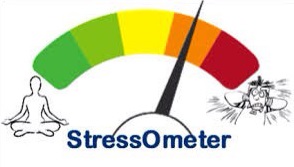Bipolar disorder is characterized by extreme shifts in mood, and when those shifts are severe enough, they can have a profound effect on your life. It may take months or years to piece your life back together after the damage is done. This I know firsthand, seriously, it’s been almost a year and a half and I am still putting the puzzle back together.
I’ve learned that one of the most common triggers is stress. Negative or stressful life events seem to trigger mood swings. There are studies that found people with bipolar disorder are seven to eight times more likely to experience an unwanted, extended period of extreme mood shift due to stress. The onset of my bipolar disorder was among the stress of major life events. I got engaged and married, my husband is Canadian so we had to go through the immigration process, and I hated my job and kept beating myself up for taking it. Eventually I fell into a deep depression and things just went downhill from there. 
Triggers are something that can set you off in a depressive episode, but they can also set you off in a manic episode. It was when the rapid cycling between depression and mania started that my life completely spiraled out of my control. It took me eight months to get the correct diagnosis and it is such a tough disease to live with, day in and day out (especially undiagnosed). Never knowing when or where your moods will change. Even with the diagnosis it was challenging because I had not yet learned what my triggers were and what to do when they came at me from all directions.
Of course, manic and depressive episodes aren’t always a result of a trigger. However, doctors claim that if you can manage your triggers then you can cut your symptoms in half. Knowledge is power, right?
I’d define a trigger as anything outside of the illness that causes mood swings. Learning to avoid what sets you off is extremely important to managing your illness. Every individual has different triggers but the most common triggers for bipolar mood swings include – stress, lack of sleep, arguments, relationship problems, drugs and alcohol, antidepressants and other medications, the change of seasons, pregnancy and birth, job loss, and death.

I have recently began charting my moods two or three times a day, or whenever I feel as if my mood is swinging. I use an app on my iPhone that allows me to rate my mood and add notes about events or feelings. I find this to be the easiest for me because I always have my phone near me. This allows me to evaluate my mood as it relates to events in my day, enabling me to identify triggers as well as things that appear to improve my mood. For example, I can wake up in a good mood but if I get in a heated argument with my husband my mood swings way down. The trigger management really seems to be helping me become more stable. As I grow more stable, I have become capable of handling certain triggers in small doses.
For those of you that also struggle with this brain disease, I strongly suggest taking the time to learn what your triggers are and create a plan for trigger management.
Feel free to share your thoughts, feelings or opinions, as always 🙂

I understand so much of this and can relate. I like the concept of learning what your triggers are; I just hate when I’m blindsided by them. I’m going thru the process (have been for a year almost) of immigrating to Australia where my husband lives. We couldn’t do the process with him staying here. (Long story). Thanks for posting this about triggers in your unique way, it’s straight to the point and extremely helpful! It’s almost like I took a type of refresher course that I needed.
LikeLiked by 1 person
Yes sometimes you can be blindsided but it helps to know for when you can catch it. I hope the immigration goes well, I know what a stress it is! I’m glad my post was helpful for you 🙂
LikeLiked by 1 person
Spot on and well said. I recently experienced this. I had a horrible stress event, actually several. On top of that I had surgery and only afterward found out the anesthesia causes depression. I find it easier to maintain (in general) then to have to stabilize ‘after’ such events. However, sometimes stressful events are inevitable and I’ve finally stopped judging myself when it happens. I’m more annoyed by the inconvenience of it all and the extra work in maintain normal relationships with my friends, and bank account, during the rebound/stabilization time.
LikeLiked by 1 person
I did not know that about anesthesia. Thanks for sharing because I am having surgery on Monday and now I will be conscious of that! I agree that trying to maintain is definitely easier than having a big mess to clean up but it is exhausting to have to put so much effort forth all the time, you’re right.
LikeLiked by 1 person
Had I known ahead of time I would have done an increase to off-set it. Another thing to maybe ask your psychiatrist is what things may cause mania. Many times diphenhydramine (benadryl) is given before surgery to relieve anxiety. I found out the hard way that it causes me to go manic, not a good thing when one is trying to recover. Steroids also induces mania for me. I had my doc put them all on my allergy list so as to squelch any argument from clueless medical staff. I have had 14 surgeries, or rather, 14 times under anesthesia, some for simple procedures, so it took me quite some tie to figure this all out. The reason I’m sharing it with you is so you can be aware for when you are post surgery with your mood tracking. If things seem awry they probably are, but knowing ahead of time can make a big difference. I write notes to myself for after surgery because if things do go awry I tend to catastrophize them despite my experience. For my upcoming surgery I’m doing something different. I’m going to ask a close friend to give me a reality check if I start waffling. She does this often for my fibro since I conveniently forget, when I’m feeling good, how bad things get if I don’t rest.
Good luck!! I hope your’s goes smoothly and all that I’ve said is simply info for the future. 🙂
LikeLiked by 1 person
I appreciate you sharing all of this. Thank you!! 😊
LikeLike
You are wise to become so self aware, learning your triggers so you can avoid them or to learn how to respond to your mood shifts. It is a lot of work but is so worth it. I’m glad you learned this early in your experience. It took me quite awhile to figure it all out and, of course, it’s a lifelong process. I wish you much success and joy in life.
LikeLiked by 2 people
Thank you 🙂
LikeLike
Thanks for the info on the app. I’m getting an iPhone for Christmas and will definitely use that.
LikeLiked by 1 person
I like your post. There is neurological research that has shown the shifts in mental states for bipolar patients to be linked to circadian rhythms. So, you are one the right track because most all (agreed upon) triggers for Bipolar are circumstances that disrupt sleep patterns.
LikeLiked by 1 person
You make some very good points. It’s also a great thing to have so much self-awareness, especially when you’re still relatively new to the diagnosis. Thank you, and also for the follow at bpnurse.com!
LikeLiked by 1 person
Another great post
LikeLiked by 1 person
Thank you!
LikeLike